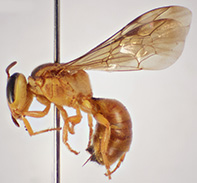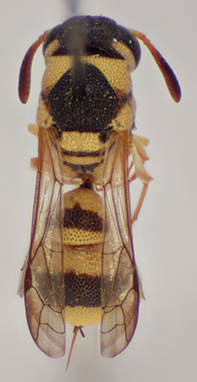Hymenoptera collection

Palaeorhiza peterseni Hirashima & Abe 2011 (Photo: Jesper B. Schmidt)
Curator
Collection managers
Anders Illum, Jan Pedersen & Sree Gayathree Selvantharan
About the collection
The collection has good overall representation across hymenopteran families, with emphasis on Ichneumonidae; and biogeographical areas, with particular emphasis on the Palearctic region.
Taxonomical coverage is some 11,000 species of the around 140,000 species described worldwide (approx. 8%).

Eustenancistrocerus jucundus afghanus Soika 1962 (Photo: Jesper B. Schmidt)
Hymenoptera collection in numbers
- Estimated number of specimens/collections: 750,000
- Types: 2,000
- Digitally available specimens: 18,000
- Percentage digitized: 2.4%
Strengths
- Mediterranean countries
- East Africa
- Southern India
- Thailand
- Sphecoid wasps worldwide
- Palearctic and Oriental Mutillidae
- Neotropical Apidae (Coll. P. Jørgensen)
Important subcollections/specimens
- I.C. Fabricius type collection
- P.N. Buhl type collection
- Greenland, Faroes and Iceland reference collections
History
The oldest part of the collection is the Fabricius material from the late 18th century. Much of the Palearctic material (e.g., the Ichneumonidae) was collected in the 19th century and has little information attached. Large parts of the Danish parasitoid wasps were collected by R.W.T. Schlick, also in the 19th century. The Greenland material has accumulated over the 19th through 21st centuries.
During the 20th century curators especially developed the sphecoid wasp (Ole Lomholdt) and Mutillidae (Børge Petersen) parts of the collection.
Substantial material is present from the Noona Dan Expedition (1961-1962) to the Eastern Pacific.
